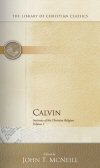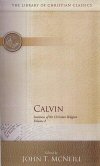Institutes of the Christian Religion (2 vols.)
Digital Logos Edition
Overview
John Calvin's Institutes of the Christian Religion is a monumental work that stands among the greatest works of Christian theology and Western literature. Written as an introduction to Christian doctrine, Calvin's Institutes quickly became one of the best systematic theologies of the Reformed tradition.
This is the definitive English-language edition of one of the monumental works of the Christian church. Under the supervision of John McNeill, a team of expert Latinists and Calvin scholars worked to produce what has become the definitive English edition of the Institutes. All previous editions—in Latin, French, German, and English—have been collated; references and notes have been verified, corrected, and expanded; and new bibliographies have been added. Translated by Ford Lewis Battles, this translation preserves the rugged strength and vividness of Calvin's writing, but also conforms to modern English and renders heavy theological terms in simple language. The result is a translation that achieves a high degree of accuracy and at the same time is eminently readable. Scholars consider this the authoritative edition of Calvin's Institutes.
These two volumes will download as a single resource in your digital library.
This title is included in the following collections
You can save when you purchase this product as part of a collection.
Logos 8 Reformed Starter Legac...
$39.99$39.99Logos 7 Reformed Starter Legac...
$39.99$39.99Logos 6 Reformed Starter Legac...
$39.99$39.99Logos 9 Reformed Starter Legac...
$39.99$39.99
- $89.99
- $89.99
- $89.99
- $89.99
- $89.99
- $89.99
- $89.99
- $89.99
- $349.99
- $349.99
- $349.99
- $349.99
- $349.99
- $349.99
- $349.99
- $349.99
- $349.99
- $349.99
- $349.99
- $399.99
- $880.80$527.99
- $599.99
- $849.99
- $849.99
- $849.99
- $849.99
- $849.99
- $849.99
- $849.99
- $849.99
- $849.99
- $849.99
- $849.99
- $849.99
- $849.99
- $849.99
- $1,499.99
- $1,499.99
- $1,499.99
- $1,499.99
- $1,499.99
- $1,499.99
- $1,499.99
- $1,499.99
- $1,499.99
- $1,499.99
- $1,499.99
- $1,499.99
- $1,499.99
- $1,499.99
- $1,499.99
- $1,499.99
- $3,953.40$2,370.99
- $2,999.99
- $5,017.57$2,999.99
- $2,999.99
- $2,999.99
- $2,999.99
- $2,999.99
- $2,999.99
- $2,999.99
- $2,999.99
- $2,999.99
- $2,999.99
- $2,999.99
- $2,999.99
- $2,999.99
- $2,999.99
- $2,999.99
- $2,999.99
- $15,739.84$4,720.99
- $4,749.99
- $4,749.99
- $4,749.99
- $4,749.99
- $4,749.99
- $4,749.99
- $4,749.99
- $4,749.99
- $4,749.99
- $4,749.99
- $4,749.99
- $4,749.99
- $4,749.99
- $4,749.99
- $10,417.33$6,249.99
- $10,999.99
- $11,399.99
- $11,399.99
- $11,399.99
- $21,749.99
- $23,999.99
- $23,999.99
- $24,999.99

- Extensive Introduction, footnotes, and bibliographies
- Multiple Indexes: Biblical References, Author and Source, Subject, Names and Places, Hebrew Words, Greek Words, and Latin Words
- Essential for studying Reformed or Calvin's theology
Top Highlights
“From this we may gather that man’s nature, so to speak, is a perpetual factory of idols.” (Page 108)
“Now we shall possess a right definition of faith if we call it a firm and certain knowledge of God’s benevolence toward us, founded upon the truth of the freely given promise in Christ, both revealed to our minds and sealed upon our hearts through the Holy Spirit.” (Page 551)
“Consequently, we know the most perfect way of seeking God, and the most suitable order, is not for us to attempt with bold curiosity to penetrate to the investigation of his essence, which we ought more to adore than meticulously to search out, but for us to contemplate him in his works whereby he renders himself near and familiar to us, and in some manner communicates himself.” (Page 62)
“For errors can never be uprooted from human hearts until true knowledge of God is planted therein.” (Page 73)
“Indeed, no one gives himself freely and willingly to God’s service unless, having tasted his fatherly love, he is drawn to love and worship him in return.” (Page 55)
Calvin's treatise on the secret providence of God shows the Reformer at his theological best and polemically most acute. Like Luther before him, he demonstrates why the doctrine of divine sovereignty lies at the very heart of the Reformation, and why the doctrine is of such singular doctrinal, pastoral, and ecclesiastical importance. It is to be hoped that this new edition will introduce a new generation to Calvin's thinking on this vital matter.
—Carl R. Trueman, Academic Dean and Vice President, Westminster Theological Seminary
Calvin's robust defense of God's providential rule of history is an excellent reminder of what was a vital concern for the French Reformer and also of his desire to be rigorously biblical and, as such, God-glorifying. Here is a pattern of theological reflection and method truly worthy of emulation.
—Michael A. G. Haykin, Professor of Church History, Southern Baptist Theological Seminary
. . . Calvin’s theology interests us in its historical context as an outstanding record of Reformation theology that historically—and at times even legally—has served as a basis of proclamation in modern Protestant churches.
Calvin helped the Reformation change the entire focus of the Christian life. Calvin’s teaching, preaching, and catechizing fostered growth in the relationship between believers and God.
—Joel R. Beeke
Calvin’s theological heritage has proved fertile perhaps to a greater extent than any other Protestant writer. Richard Baxter, Jonathan Edwards, and Karl Barth, in their very different ways, bear witness to the pivotal role that Calvin’s ideas have played in shaping Protestant self-perceptions down the centuries. . . . It is impossible to understand modern Protestantism without coming to terms with Calvin’s legacy to the movement which he did so much to nourish and sustain.
—Alister E. McGrath
The fundamental issue for John Calvin—from the beginning of his life to the end—was the issue of the centrality and supremacy and majesty of the glory of God.
John Calvin is a man of distinguished reputation, one of the great figures of church history.
—Wulfert de Greef
It would hardly be too much to say that for the latter part of his lifetime and a century after his death John Calvin was the most influential man in the world, in the sense that his ideas were making more history than those of anyone else during that period. Calvin’s theology produced the Puritans in England, the Huguenots in France, the ‘Beggars’ in Holland, the Covenanters in Scotland, and the Pilgrim Fathers of New England, and was more or less directly responsible for the Scottish uprising, the revolt of the Netherlands, the French wars of religion, and the English Civil War. Also, it was Calvin’s doctrine of the state as a servant of God that established the ideal of constitutional representative government and led to the explicit acknowledgment of the rights and liberties of subjects. . . . It is doubtful whether any other theologian has ever played so significant a part in world history.
[Calvin] easily takes the lead among the systematic expounders of the Reformed system of Christian doctrine. . . . Calvin’s theology is based upon a thorough knowledge of the Scriptures. He was the ablest exegete among the Reformers, and his commentaries rank among the very best of ancient and modern times. His theology, therefore, is biblical rather than scholastic, and has all the freshness of enthusiastic devotion to the truths of God’s Word. At the same time he was a consummate logician and dialectician. He had a rare power of clear, strong, convincing statement. He built up a body of doctrines which is called after him, and which obtained symbolical authority through some of the leading Reformed Confessions of Faith.
What is it about Calvin that so inspires me? This: his disciplined style, his determination never to speculate, his utter submission to Bible words as God's words, his submission to Christ's Lordship, his sense of the holy, his concern to be as practical as possible; the fact that godly living was his aim and not theology for the sake of it. In a forest of theologians, Calvin stands like a Californian Redwood, towering over everyone else.
—Derek Thomas, John E. Richards Professor of Systematic and Practical Theology, Reformed Theological Seminary, Jackson
A little bit of the world’s history was enacted in Geneva.
—Ludwig Häusser
The greatest exegete and theologian of the Reformation was undoubtedly Calvin. . . . He is one of the greatest interpreters of Scripture who ever lived. He owes that position to a combination of merits. He had a vigorous intellect, a dauntless spirit, a logical mind, a quick insight, a thorough knowledge of the human heart, quickened by rich and strange experience; above all, a manly and glowing sense of the grandeur of the Divine. The neatness, precision, and lucidity of his style, his classic training and wide knowledge, his methodical accuracy of procedure, his manly independence, his avoidance of needless and commonplace homiletics, his deep religious feeling, his careful attention to the entire scope and context of every passage, and the fact that he has commented on almost the whole of the Bible, make him tower above the great majority of those who have written on Holy Scripture.

Contents
- John Calvin to the Reader, 1559
- Subject Matter of the Present Work
- Prefatory Address to King Francis I of France
- Book One: The Knowledge of God the Creator
John T. McNeill (1885–1975) was Professor of the History of European Christianity at the University of Chicago and then Auburn Professor of Church History at Union Theological Seminary in New York.

Contents
- Book Two: The Knowledge of God the Redeemer in Christ, First Disclosed to the Fathers under the Law, and Then to Us in the Gospel
- Book Three: The Way in Which We Receive the Grace of Christ: What Benefits Come to Us from It, and What Effects Follow
- Book Four: The External Means or Aids by Which God Invites Us into the Society of Christ and Holds Us Therein
John T. McNeill (1885–1975) was Professor of the History of European Christianity at the University of Chicago and then Auburn Professor of Church History at Union Theological Seminary in New York.
Reviews
39 ratings

Maxim Farocanag
5/22/2025
Something is wrong with the citation: Calvin, John. Institutes of the Christian Religion & 2. Edited by John T. McNeill. Translated by Ford Lewis Battles. Vol. 1. The Library of Christian Classics. Louisville, KY: Westminster John Knox Press, 2011. What is &2?Karina Gabriel Stavenes
12/19/2023

Lincoln A. Bovee'
9/25/2023
I found this edition to be so much easier to read than the much older Beveridge translation.
Joshua Steele
12/22/2022
Tom de Lacey
10/22/2022
Stephen Rafalsky
10/14/2022
Steven Blader
6/15/2022
Christian Girl
10/9/2020
Westminster Seminary CA compares the different translations and they teach the Beveridge translation is the one to own because it doesn't have modern headings added that put unwarranted interpretations on the text and it also has the most helps, indexes and introductions.
Jun Liu
11/29/2018